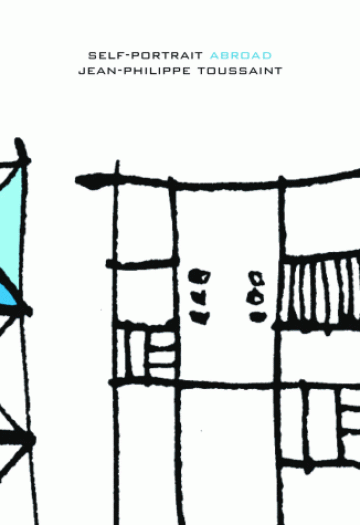SELF-PORTRAIT ABROAD by Jean-Philippe Toussaint
For years I've been telling friends, acquaintances, even people at parties I speak to for five minutes, to read Jean-Philippe Toussaint. But I always have difficulty recommending a novel of his to start with. Though Toussaint is never less than lucid, nuanced, and very funny, and, like Chaplin or Woody Allen, frequently features the same protagonist – a resolutely passive upper-middle-class intellectual who somehow keeps getting into slapstick situations – there isn't a single one of his books that shows off all he can do.
The Bathroom, in which the narrator decides to calmly live in his bathroom – until he runs off to Venice on an impulse – is a hilarious portrayal of existential anxiety, but it keeps to the margins the melancholy undercurrent Toussaint is so good at evoking, as well as his playful critiques of technology. Camera is an elegant consideration of media, representation, and thinking itself, but the typical Toussaint hero might seem unconvincingly eccentric if you haven't read, say, The Bathroom. Still, it's Camera that will bring into focus the concerns of the yet subtler Television, whose protagonist, having quit TV, perceives its effects everywhere. And so on.
And so I end up telling everyone to begin with any of Toussaint's books, but to be sure to read three or four in a row (but not to worry, they're short).
Now Toussaint might have solved my problem for me. The first paragraph of Self-Portrait Abroad, his latest book to be translated into English, is a perfect introduction to his work:
Every time I travel I feel a very slight feeling of dread at the moment of departure, a dread sometimes shaded with a soft shiver of elation. Because I know that any trip brings with it the possibility of death – or of sex (both highly improbable of course, yet not to be excluded altogether).
That's Toussaint – or the essence of the Toussaint persona: as the world accelerates, he feels increasingly vulnerable, but he keeps himself together with a slight, fragile, personal pride. Dread and fastidiousness so seamlessly come together in the prose that frequently – as between those parentheses – the very same words express both. His presentiments are, at the same time, punch lines.
The rest of Self-Portrait Abroad? It's Toussaint at his lightest. A Belgian writer named Jean-Philippe vacations and attends literary conferences around the world. In Tokyo he struggles with static electricity (“I had strange experiences with my hands”). In Berlin he urges a butcher to cut him a thicker slice of aspic (“I looked her intensely in the eyes”). On the way to Prague he and his wife attempt sex in their train-compartment (“You don't know how to make love in a train, she said with a smile”). He wins a boules tournament in Corsica (“the best day of my life”).
None of the locales is explored in any depth – we get glimpses of cities, a few beautiful vistas, some remarks on foreign manners – and the people he meets merge into a stream of tics, eccentricities, and styles of dress. The narrator's focus is always his own ceaseless self-consciousness, although not much happens to him. His worst experience is a minor back pain while learning to make sushi; his most profound, several reflections on the passage of time and writing while standing in the rain in Kyoto.
But that is not a complaint. These are perfectly executed comic sketches. Each develops with seeming spontaneity, and every joke is a surprise. If the episodes feel casual, that's because the prose is exceptionally, imperceptibly, precise. It is an accomplishment of the highest artistry – and perhaps even a first for literature – if a scene is so expertly set that a character inopportunely pouring a glass of mineral water makes you laugh out loud.
It's in Toussaint's other novels that the humor is intertwined with a sense of human tenuousness. That only happens in this one in that first paragraph, and in a short section near the end. But now I have a recommendation to make: begin with Self-Portrait Abroad – then read all the rest of Toussaint's books.
Jean-Philippe Toussaint is the author of nine novels. The most recent, The Truth About Marie, won the Prix Decembre in 2009.
